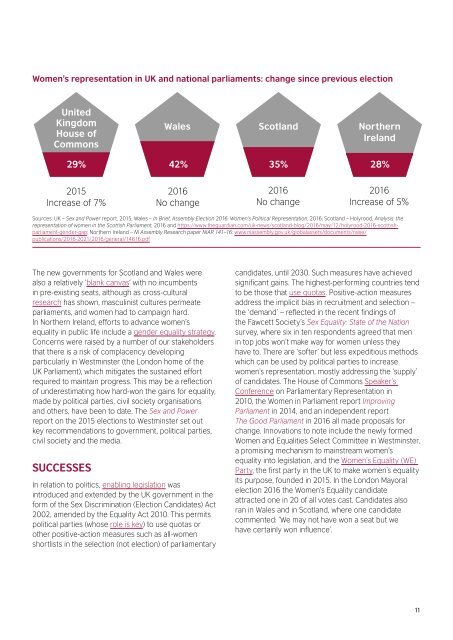GENDER EQUALITY AND EMPOWERMENT OF WOMEN AND GIRLS IN THE UK
gender_equality_an_empowerment_in_the_uk
gender_equality_an_empowerment_in_the_uk
Create successful ePaper yourself
Turn your PDF publications into a flip-book with our unique Google optimized e-Paper software.
Women’s representation in <strong>UK</strong> and national parliaments: change since previous election<br />
United<br />
Kingdom<br />
House of<br />
Commons<br />
Wales Scotland Northern<br />
Ireland<br />
29% 42% 35% 28%<br />
2015<br />
Increase of 7%<br />
2016<br />
No change<br />
2016<br />
No change<br />
2016<br />
Increase of 5%<br />
Sources: <strong>UK</strong> – Sex and Power report, 2015; Wales – In Brief, Assembly Election 2016: Women’s Political Representation, 2016; Scotland – Holyrood, Analysis: the<br />
representation of women in the Scottish Parliament, 2016 and https://www.theguardian.com/uk-news/scotland-blog/2016/may/12/holyrood-2016-scottishparliament-gender-gap;<br />
Northern Ireland – NI Assembly Research paper NIAR 141–16: www.niassembly.gov.uk/globalassets/documents/raise/<br />
publications/2016-2021/2016/general/14616.pdf<br />
The new governments for Scotland and Wales were<br />
also a relatively ‘blank canvas‘ with no incumbents<br />
in pre-existing seats, although as cross-cultural<br />
research has shown, masculinist cultures permeate<br />
parliaments, and women had to campaign hard.<br />
In Northern Ireland, efforts to advance women’s<br />
equality in public life include a gender equality strategy.<br />
Concerns were raised by a number of our stakeholders<br />
that there is a risk of complacency developing<br />
particularly in Westminster (the London home of the<br />
<strong>UK</strong> Parliament), which mitigates the sustained effort<br />
required to maintain progress. This may be a reflection<br />
of underestimating how hard-won the gains for equality,<br />
made by political parties, civil society organisations<br />
and others, have been to date. The Sex and Power<br />
report on the 2015 elections to Westminster set out<br />
key recommendations to government, political parties,<br />
civil society and the media.<br />
SUCCESSES<br />
In relation to politics, enabling legislation was<br />
introduced and extended by the <strong>UK</strong> government in the<br />
form of the Sex Discrimination (Election Candidates) Act<br />
2002, amended by the Equality Act 2010. This permits<br />
political parties (whose role is key) to use quotas or<br />
other positive-action measures such as all-women<br />
shortlists in the selection (not election) of parliamentary<br />
candidates, until 2030. Such measures have achieved<br />
significant gains. The highest-performing countries tend<br />
to be those that use quotas. Positive-action measures<br />
address the implicit bias in recruitment and selection –<br />
the ‘demand’ – reflected in the recent findings of<br />
the Fawcett Society’s Sex Equality: State of the Nation<br />
survey, where six in ten respondents agreed that men<br />
in top jobs won’t make way for women unless they<br />
have to. There are ‘softer’ but less expeditious methods<br />
which can be used by political parties to increase<br />
women’s representation, mostly addressing the ‘supply’<br />
of candidates. The House of Commons Speaker’s<br />
Conference on Parliamentary Representation in<br />
2010, the Women in Parliament report Improving<br />
Parliament in 2014, and an independent report<br />
The Good Parliament in 2016 all made proposals for<br />
change. Innovations to note include the newly formed<br />
Women and Equalities Select Committee in Westminster,<br />
a promising mechanism to mainstream women’s<br />
equality into legislation, and the Women’s Equality (WE)<br />
Party, the first party in the <strong>UK</strong> to make women’s equality<br />
its purpose, founded in 2015. In the London Mayoral<br />
election 2016 the Women’s Equality candidate<br />
attracted one in 20 of all votes cast. Candidates also<br />
ran in Wales and in Scotland, where one candidate<br />
commented: ‘We may not have won a seat but we<br />
have certainly won influence’.<br />
11


